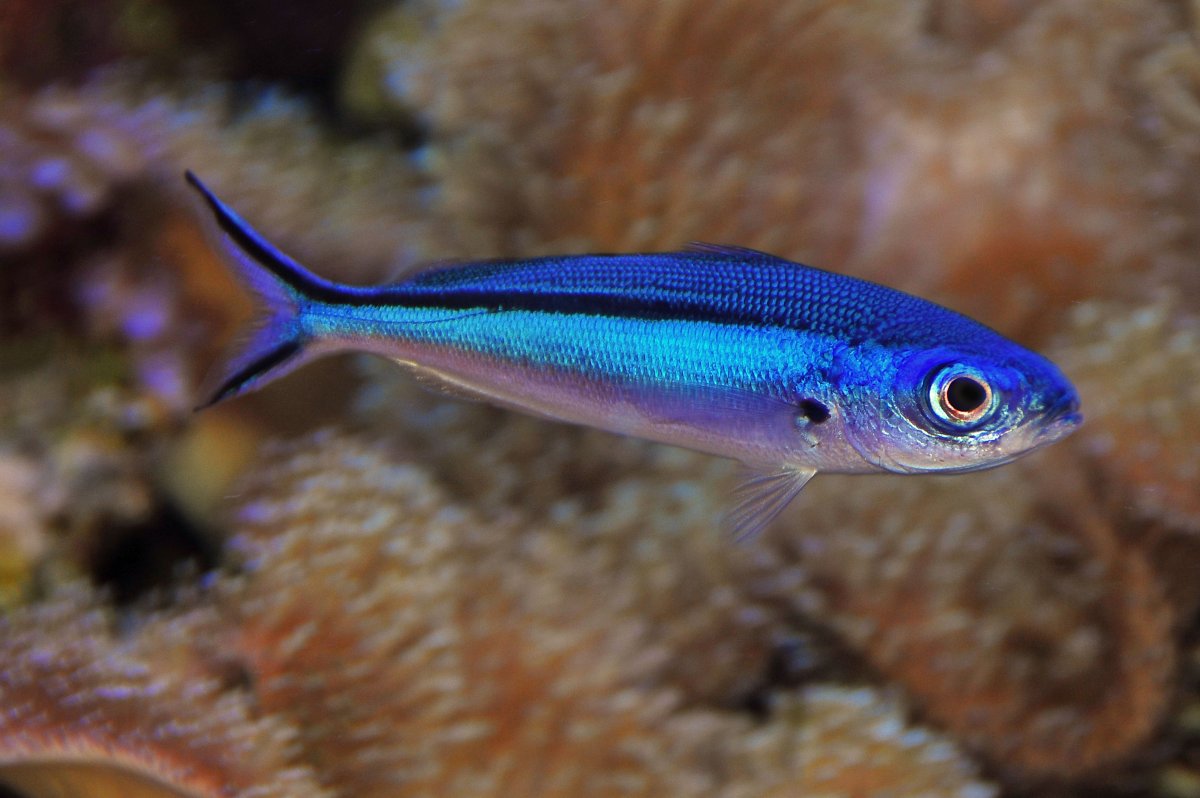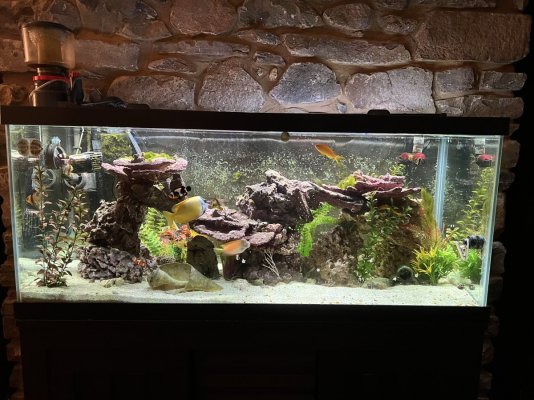What rate would you say the YT has grown at?While my YT has not grown as fast, my blue has grown at a 1-1/2” yearly rate, he’s 4 years old now and almost 6”. No way you keep a 6” fish in a 65g tank.
Upgraded months ago from 65g to 180g, he fits better now.
Maybe his grow will slow now, but he got big, fast.
Navigation
Install the app
How to install the app on iOS
Follow along with the video below to see how to install our site as a web app on your home screen.
Note: This feature may not be available in some browsers.
More options
You are using an out of date browser. It may not display this or other websites correctly.
You should upgrade or use an alternative browser.
You should upgrade or use an alternative browser.
Shout Out: Smallest Tank, Biggest Tang and YOU!
- Thread starter revhtree
- Start date
- Tagged users None
- Joined
- Dec 28, 2016
- Messages
- 22,829
- Reaction score
- 21,962
I dont know if you were responding to something I said but - I am not sure that this is normal for most tangs. But congratulations on having such a large tang. In fact - I'm not sure I've seen a 6 inch yellow tang (that has grown to that size in such a small tank)While my YT has not grown as fast, my blue has grown at a 1-1/2” yearly rate, he’s 4 years old now and almost 6”. No way you keep a 6” fish in a 65g tank.
Upgraded months ago from 65g to 180g, he fits better now.
Maybe his grow will slow now, but he got big, fa
- Joined
- Apr 16, 2018
- Messages
- 265
- Reaction score
- 167
Hey sorry to reply to an old thread but this seems like a good place to ask this question. I'm setting up a 150 reef and I plan on putting a combination of tangs from different families in the tank. I was thinking either a yellow, a convict, and a blue hippo, or a tomini/kole, a yellow, and an atlantic blue. I would prefer the first option, but I've heard very mixed things about blue hippos in 150s. Do either of these sound like viable options?
Hey sorry to reply to an old thread but this seems like a good place to ask this question. I'm setting up a 150 reef and I plan on putting a combination of tangs from different families in the tank. I was thinking either a yellow, a convict, and a blue hippo, or a tomini/kole, a yellow, and an atlantic blue. I would prefer the first option, but I've heard very mixed things about blue hippos in 150s. Do either of these sound like viable options?
You just have to be careful with tangs because they can be very aggressive towards each other. Personally, I think blues need to be in huge tanks. They get SO BIG fully grown, and if you're planning on having them for years, you have to expect that.
If you can skip the Atlantic blue they can be very aggressive. The hippo swims a lot and needs lots of room. The other you can do fine in a 150 together, IMO. I have 2 tangs in a 110. 5 in a 300gal and another 5 in my other 300gal fish only tank. I have had all the tangs you mentioned. Good luck!Hey sorry to reply to an old thread but this seems like a good place to ask this question. I'm setting up a 150 reef and I plan on putting a combination of tangs from different families in the tank. I was thinking either a yellow, a convict, and a blue hippo, or a tomini/kole, a yellow, and an atlantic blue. I would prefer the first option, but I've heard very mixed things about blue hippos in 150s. Do either of these sound like viable options?
vetteguy53081
Well known Member and monster tank lover
View Badges
Partner Member 2024
Excellence Award
Reef Tank 365
RGB
Article Contributor
Tampa Bay Reef Keepers
West Palm Beach Reefer
Hospitality Award
Ocala Reef Club Member
305 Reef Club
Wisco Reefers
Midwest Reefer
Fish Medic
MAC of SW Florida
Rock Pool Reef Keepers
R2R Secret Santa 2023
My Tank Thread
My Aquarium Showcase
Especially if theyre juveniles- you should be fine. Make the atlantic blue the last addition and provide plenty of swim space and hiding for them and Diet is important.
Hey just wondering can we actually make the Tang Police a thing? Like where you'd have to apply and meet certain requirements. It'd be like a cool exclusive club. Maybe even get a R2R "Official Tang Police" badge maybe...? Im no tang police, i have a 20g (which we all know is too small for one), but it'd be a cool club or smth to have.
Please don’t do this. This fire has burned brightly enough on its own for decades without gasoline.Hey just wondering can we actually make the Tang Police a thing? Like where you'd have to apply and meet certain requirements. It'd be like a cool exclusive club. Maybe even get a R2R "Official Tang Police" badge maybe...? Im no tang police, i have a 20g (which we all know is too small for one), but it'd be a cool club or smth to have.
Hey just wondering can we actually make the Tang Police a thing? Like where you'd have to apply and meet certain requirements. It'd be like a cool exclusive club. Maybe even get a R2R "Official Tang Police" badge maybe...? Im no tang police, i have a 20g (which we all know is too small for one), but it'd be a cool club or smth to have.
Swimming distance is paramount to water volume but my recommendation is 70 gallons: kole yellow eye/bristletooth, 90 gallons: yellow, scopas, lemon peel, mimic lemon peel, convict, Atlantic blue, 125 gallons: Pacific blue, powder blue/powder brown/whitecheek, gemmatum (gem), 180 gallons: clown, Sohal, Achilles, Naso, Sailfin 220 gallons: unicorn
It depends on the individual fish. Every aquarist should familiarize them selves with steriotypy behaviour and be ready to rehome a fish if it demonstrates it. https://www.zawec.org/en/fact-sheets/44-stereotypies-as-animal-welfare-indicators
"Elvis" a sailfin bought in '84 and was quite happy in a 90 gallon bowfront for ~12 years before being rehomed to a 240. But I've seen smaler fish in bigger tanks wear themselves out constantly swimming from one end to the other and never really intrracting with their environment
"Elvis" a sailfin bought in '84 and was quite happy in a 90 gallon bowfront for ~12 years before being rehomed to a 240. But I've seen smaler fish in bigger tanks wear themselves out constantly swimming from one end to the other and never really intrracting with their environment
I keep a yellow-eyed bristletooth tang in a 75g, he’s about 3 inches long, and he’s been very happy. He’s grazing all day, and swims in and out of the rocks. At night he sleeps underground in one of the caves underneath the central stone pillar and never seems stressed. The fox face that’s twice the size of the tang is calmer than he is and they follow each other around all day. Even keep a mirror suction cupped to the back of the tank in the corner that the tang and my cleaner wrasse look at all day. Almost never shows any sign of aggression.
between ample space around the rocks and enough things to keep their interest, I find that you can have a happy balance with a smaller tank size.
between ample space around the rocks and enough things to keep their interest, I find that you can have a happy balance with a smaller tank size.
Attachments
I don't think I ever linked this article to this thread:

 www.reef2reef.com
www.reef2reef.com
Jay
Estimating the Need for Swimming Space for Aquarium Fishes
This article explores required aquarium sizes for marine fishes
 www.reef2reef.com
www.reef2reef.com
Jay
It depends on the individual fish. Every aquarist should familiarize them selves with steriotypy behaviour and be ready to rehome a fish if it demonstrates it. https://www.zawec.org/en/fact-sheets/44-stereotypies-as-animal-welfare-indicators
"Elvis" a sailfin bought in '84 and was quite happy in a 90 gallon bowfront for ~12 years before being rehomed to a 240. But I've seen smaler fish in bigger tanks wear themselves out constantly swimming from one end to the other and never really intrracting with their environment
I am sure they are not happy. Both of these huge tangs exist in that tank, but happy? I don't think so.
There are strong feeling on this subject. There is nothing I can do for the two tangs so I try my best to put it out of my mind. It just cause me to be sad when I see it.
(I was going to type "I am not sure about been happy" but decided to change what I typed).
Last edited:
Call the tang police, NOW. That car is too small for the 4 tangs. They need an Ocean Liner, or at least one of those magic bus seen in Harry Potter In “The Prisoner of Azkaban”
Last edited:
Fish Styx
In Cod We Crust
View Badges
Partner Member 2024
Reef Tank 365
RGB
Hospitality Award
Reef Pumpkin Carver
WAMAS
Rock Pool Reef Keepers
R2R Secret Santa 2023
My Tank Thread
My Aquarium Showcase
I am sure they are not happy. Both of these huge tangs exist in that tank, but happy? I don't think so.
There are strong feeling on this subject. There is nothing I can do for the two tangs so I try my best to put it out of my mind. It just cause me to be sad when I see it.
(I was going to type "I am not sure about been happy" but decided to change what I typed).
Ok, how have you determined they're not happy? What specific behaviors should aquarists look for to determine if their fish are happy or sad?
OK, how have you determined they're "quite happy"? What specific behaviors should aquarists look for to determine if their fish are happy or sad?OK, how have you determined they're happy? What specific behaviors should aquarists look for to determine if their fish are happy or sad?
I guess this is just a rhetorical question. You don't have to answer it.
Ok, how have you determined they're not happy? What specific behaviors should aquarists look for to determine if their fish are happy or sad?
Oh! The old "happy fish" observation! Here is an editorial I wrote on that topic. TLDR - the last paragraph is my definition:
Happy fish?
Driving in to work one morning, with a half a pot of strong coffee boiling through my veins, I got to pondering – when you hear somebody say, "you need to do X,Y,Z in order to keep your fish happy" or "your fish cannot be happy in that size tank" what do they really mean? Are they using the word "happy" in place of "healthy" or "proper well-being"? Or do they really mean to imply that true happiness can be identified and then quantified in fish?
I may use that term myself – "Man, that fish sure is unhappy." to identify a fish being bullied by a tankmate. What I really mean is "That fish has an ongoing territorial conflict with a tankmate, it is exhibiting a depressed demeanor and its well-being is compromised. If something isn’t done to change the situation, that fish’s health will be affected, eventually to the point of morbidity followed by mortality". It is just faster (but far less precise) to use the word "unhappy".
On the other hand, an animal rights advocate may look at a single fish in a tank and exclaim, "how unhappy that fish must be, all alone in that small tank". I suspect that in these cases, they mean not the fish’s well-being and health, but that it is truly unhappy in the mammal paradigm of how the word is generally used in English.
Now don't get me wrong, I don’t have a problem that some people do with semantics – as long as their intent is clear. Same thing could be the case with "happiness", I'm content to let the term ride unless I think the people really mean "smiley face" happy, as in "the opposite of sad" when talking about fish.
However, if for example, one of the "tang police" say, "hepatus tangs need at least a 150 gallon tank in order to be happy" they are not using the word in place of "healthy" if that same tang can be kept healthy and problem free, long term, in a 75 gallon tank. They are then adding an extra layer to the definition, one that cannot be measured or quantified. I do have a problem with that, it is misleading or ambiguous at best.
I’m not condoning keeping fish in overly small aquariums, I’m just opining that you cannot formulate tank size requirements based on intangibles such as the "happiness" of a fish. If your opinion is that this example fish is so much happier in the 150 gallon than the 75 gallon, that the smaller tank becomes a non-starter, then the fish would be whole orders of magnitude "happier" in the wild, and shouldn’t be kept in an aquarium at all.
Since 1985, I have been collecting fish respiration rate data as a means to try and identify stress in captive fishes. Certainly, I discovered that stressed fish respire at a higher rate (with temperature, species, and size all being factored in). I then collected baseline data from wild fishes in the Bahamas and the Galapagos. My hypothesis was that fish from the wild would respire at the best, most stress-free rate. Funny thing – almost all of those fishes respired faster than captive fish. It turns out that swimming against currents and waves, sculling around looking for food and out-swimming predators were all combining to cause these fish to be MORE physically stressed than captive fish by this measure. Are they less happy then?
So here is my working definition of "appropriate aquarium husbandry", and I say this equates to "happy" for a captive fish:
If the fish shows no signs of chronic disease or abnormality, exhibits normal feeding and reproductive behaviors and most importantly, exhibits a normal lifespan compared to that of wild counterparts (minus the predation that wild fish incur of course!), then there is no other metric we can use to determine if a certain suite of husbandry techniques are suitable or not.
Similar threads
- Replies
- 31
- Views
- 340
- Replies
- 56
- Views
- 1,263
- Replies
- 4
- Views
- 146



















